Kamala Harris ends campaign for presidential bid, citing lack of funding
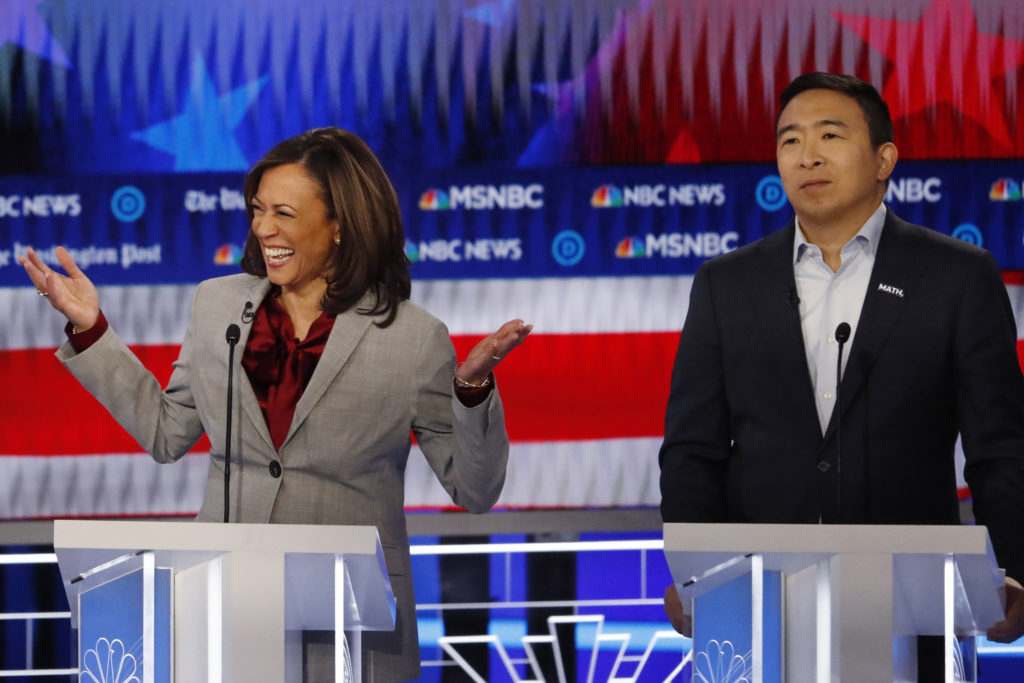
Sen. Kamala Harris told supporters on Tuesday that she was ending her bid for the 2020 Democratic presidential nomination, an abrupt close to a candidacy that held historic potential. “I’ve taken stock and looked at this from every angle, and over the last few days have come to one of the hardest decisions of my life,” the California Democrat said. “My campaign for president simply doesn’t have the financial resources we need to continue.” A senior campaign aide said Harris made the decision Monday after discussing the path forward with family and other top officials over the Thanksgiving holiday. Her withdrawal marked a dramatic fall for a candidate who showed extraordinary promise in her bid to become the first black female president. Harris launched her campaign in front of 20,000 people on a chilly January day in Oakland, California. The first woman and first black attorney general and U.S. senator in California’s history, she was widely viewed as a candidate poised to excite the multiracial coalition of voters that sent Barack Obama to the White House. Her departure erodes the diversity of the Democratic field, which is dominated at the moment by a top tier that is white and mostly male. “She was an important voice in the race, out before others who raised less and were less electable. It’s a loss not to have her voice in the race,” said Aimee Allison, who leads She the People, a group that promotes women of color. Harris ultimately could not craft a message that resonated with voters or secure the money to continue her run. She raised an impressive $12 million in the first three months of her campaign and quickly locked down major endorsements meant to show her dominance in her home state, which offers the biggest delegate haul in the Democratic primary contest. But as the field grew, Harris’ fundraising remained flat; she was unable to attract the type of attention being showered on Pete Buttigieg by traditional donors or the grassroots firepower that drove tens of millions of dollars to Elizabeth Warren and Bernie Sanders. In her note to supporters, Harris lamented the role of money in politics and, without naming them, took a shot at billionaires Tom Steyer and Michael Bloomberg, who are funding their own presidential bids. “I’m not a billionaire,” she said. “I can’t fund my own campaign. And as the campaign has gone on, it’s become harder and harder to raise the money we need to compete.” Harris suffered from what allies and critics viewed as an inconsistent pitch to voters. Her slogan “For the people” referenced her career as a prosecutor, a record that was viewed skeptically by the party’s most progressive voters. Through the summer, she focused on pocketbook issues and her “3 a.m. agenda,” a message that never seemed to resonate with voters. By the fall, she had returned to her courtroom roots with the refrain that “justice is on the ballot,” both a cry for economic and social justice as well as her call that she could “prosecute the case” against a “criminal” president. At times, she was tripped up by confusing policy positions; particularly on health care. After suggesting she would eliminate private insurance in favor of a fully government-run system, Harris eventually rolled out a health care plan that preserves a role for private insurance. Stumbles, often of the campaign’s making, continued to dog Harris into the winter, stymieing her ability to capitalize on solid moments. Harris kicked off November with a well-received speech at a massive Iowa dinner, just a day after her campaign announced it would fire staff at its Baltimore headquarters and was moving some people from other early states to Iowa. Her message was regularly overshadowed by campaign aides and allies sharing grievances with the news media. Several top aides decamped for other campaigns, one leaving a blistering resignation letter. “Because we have refused to confront our mistakes, foster an environment of critical thinking and honest feedback, or trust the expertise of talented staff, we find ourselves making the same unforced errors over and over,” Kelly Mehlenbacher wrote in her letter, obtained by The New York Times. Mehlenbacher now works for businessman Bloomberg’s campaign. With Harris’ exit, 15 Democrats remain in the race for the nomination. Several praised her on Tuesday. Former Vice President Joe Biden, who had a memorable debate stage tussle with Harris this summer, called the senator a “solid person, loaded with talent.” Vermont Sen. Bernie Sanders commended Harris for “running a spirited and issue-oriented campaign.” New Jersey Sen. Cory Booker, one of two black candidates still in the campaign, called Harris a “trailblazer.” Harris anchored her campaign in the powerful legacy of pioneering African Americans. Her campaign launch on the Martin Luther King Jr. holiday included a nod to Shirley Chisholm, the New York congresswoman who sought the Democratic Party’s presidential nomination 47 years ago earlier. One of her first stops as a candidate was to Howard University, the historically black college that she attended as an undergraduate. She spent much of her early campaign focusing on South Carolina, which hosts the first Southern primary and has a significant African American population. But Harris struggled to chip away at Biden’s deep advantage with black voters who are critical to winning the Democratic nomination. Harris and her aides believe she faced an uphill battle — and unfair expectations for perfection — from the start as a woman of color. Her campaign speech included a line about what Harris called the “donkey in the room,” a reference to the thought that Americans wouldn’t elect a woman of color. Harris often suggested it was criticism she faced in her other campaigns — all of which she won. Her departure from the presidential race marks her first defeat as a political candidate. Associated Press writers Steve Peoples in New York and Bill Barrow in Mason City, Iowa, contributed to this report. By Kathleen Ronayne and Nicholas Riccardi Associated Press. Republished with the Permission of the Associated Press.
Congress pushes ahead on Donald Trump impeachment with nation split
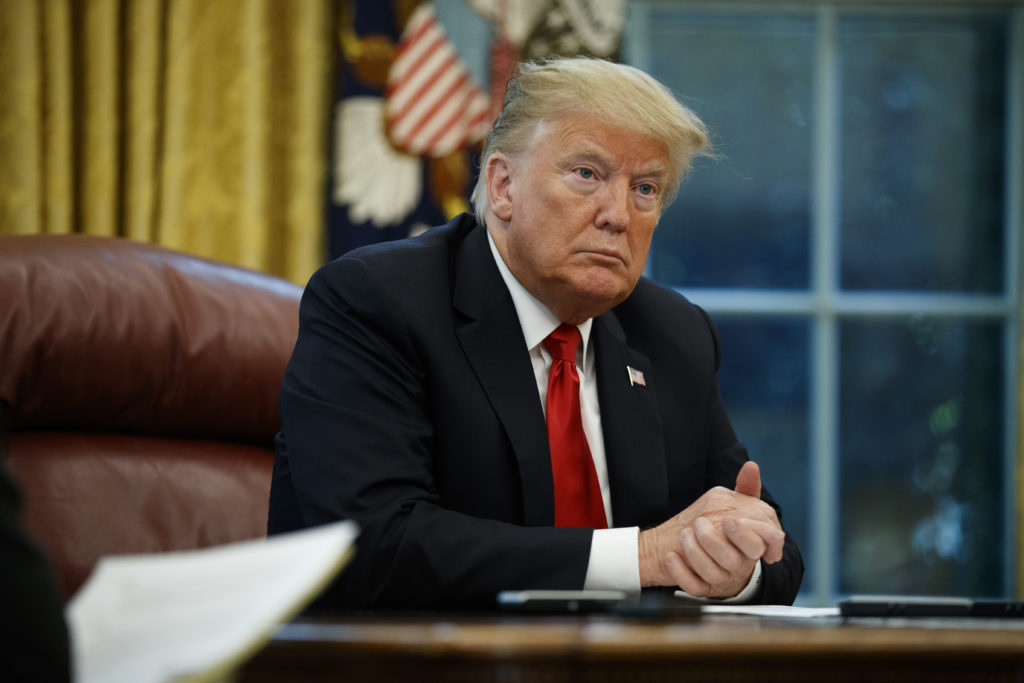
The House is plunging into a landmark impeachment week, with Democrats who once hoped to sway Republicans now facing the prospect of an ever-hardening partisan split over the question of removing President Donald Trump from office. Lawmakers were getting their first look at the House Intelligence Committee’s impeachment report Monday night behind closed doors. The findings are expected to forcefully make the Democrats’ case that Trump engaged in what Chairman Adam Schiff calls impeachable “wrongdoing and misconduct” in pressuring Ukraine to investigate Democrats and Joe Biden while withholding military aid to the ally. For Republicans offering an early rebuttal ahead of the report’s public release, the proceedings are simply a “hoax,” with Donald Trump insisting he did nothing wrong and his GOP allies in line behind him. Trump tweeted his daily complaints about it all and then added a suggestive, if impractical, question: “Can we go to Supreme Court to stop?” With the Judiciary Committee set to launch its first hearing Wednesday, the impeachment proceedings are presenting a historic test of political judgment in a case that is dividing Congress and the country. Departing for a NATO meeting in London, Trump criticized the House for pushing forward Monday with proceedings while he was heading overseas, a breach of political decorum that traditionally leaves partisan differences at the water’s edge. He predicted Republicans would actually benefit from the entire impeachment effort against him, though “it’s a disgrace for our country.” For the Democrats, House Speaker Nancy Pelosi faces a critical moment of her leadership as she steers the process ahead after resisting the impeachment inquiry through the summer, warning it was too divisive for the country and required bipartisan support. Speaking to reporters at the international climate conference in Madrid, Pelosi declined to engage with impeachment questions. “When we travel abroad, we don’t talk about the president in a negative way,” she said. “We save that for home.” Possible grounds for impeachment are focused on whether Trump abused his office as he pressed Ukrainian President Volodymyr Zelenskiy in a July 25 phone call to launch investigations into Trump’s political rivals. At the time, Trump was withholding $400 million in military aid, jeopardizing key support as Ukraine faced an aggressive Russia at its border. The report, which the Intelligence panel will vote on Tuesday and make public, also is expected to include evidence the Democrats say suggests obstruction of Congress, based on Trump’s instructions for his administration to defy subpoenas for documents and testimony. The next step comes when the Judiciary Committee gavels open its own hearing with legal experts to assess the findings and consider potential articles of impeachment ahead of a possible vote by the full House by Christmas. That would presumably send it to the Senate for a trial in January. The Democratic majority on the Intelligence Committee says its report, compiled after weeks of testimony from current and former diplomats and administration officials, will speak for itself in laying out the president’s actions toward Ukraine. Republicans pre-empted the report’s public release with their own 123-page rebuttal. In it, they claim there’s no evidence Trump pressured Zelenskiy. Instead, they say Democrats just want to undo the 2016 election. Republicans dismiss witness testimony of a shadow diplomacy being run by Trump lawyer Rudy Giuliani, and they rely on the president’s insistence that he was merely concerned about “corruption” in Ukraine — though the White House transcript of Trump’s phone call with Zelenskiy never mentions the word. “They are trying to impeach President Trump because some unelected bureaucrats chafed at an elected President’s ‘outside the beltway’ approach to diplomacy,” according to the report from Republican Reps. Devin Nunes of California, Jim Jordan of Ohio and Michael McCaul of Texas. Rep. Jim Jordan, Republican-Ohio, appeared to be the only lawmaker who viewed the Democratic report Monday evening when it became available behind closed doors for members of the intelligence panel. He said it was “long.” Jordan declined to discuss details, but said it’s the same “lame case” Democrats presented throughout impeachment hearings. “The president did nothing wrong,” Jordan said. “The facts are on our side.” Trump on Monday pointed to Zelenskiy’s recent comments as proof he did nothing wrong. The Ukrainian president said in an interview he never talked to Trump “from the position of a quid pro quo,” but he didn’t say Trump did nothing wrong. In fact, he had strong criticism for Trump’s actions in the Time magazine interview. With Ukraine at war with Russia, he said, its partners “can’t go blocking anything for us.” Schiff said the GOP response was intended for an audience of one, Trump, whose actions are “outside the law and constitution.” The finished Intelligence Committee report sets up the week’s cascading actions. Democrats could begin drafting articles of impeachment against the president in a matter of days, with voting in the Judiciary Committee next week. Republicans on the committee, led by Rep. Doug Collins of Georgia, plan to use procedural moves to stall the process and portray the inquiry as unfair to the president. The White House declined an invitation to participate, with Counsel Pat Cipollone denouncing the proceedings as a “baseless and highly partisan inquiry” in a letter to Judiciary Chairman Jerrold Nadler, Democart-New York. Trump had previously suggested that he might be willing to offer written testimony under certain conditions, though aides suggested they did not anticipate Democrats would ever agree to them. Cipollone’s letter of nonparticipation applied only to the Wednesday hearing, and he demanded more information from Democrats on how they intended to conduct further hearings before Trump would decide whether to participate. Nadler said Monday if the president really thought his call with Ukraine was “perfect,” as he repeatedly says, he would “provide exculpatory information that refutes the overwhelming evidence of his abuse of power.” House rules provide the president and his attorneys the right to cross-examine witnesses and review evidence before the committee, but little ability to bring forward witnesses of their own. Asked why not have his lawyers participate, Trump said
Steve Bullock ends presidential campaign
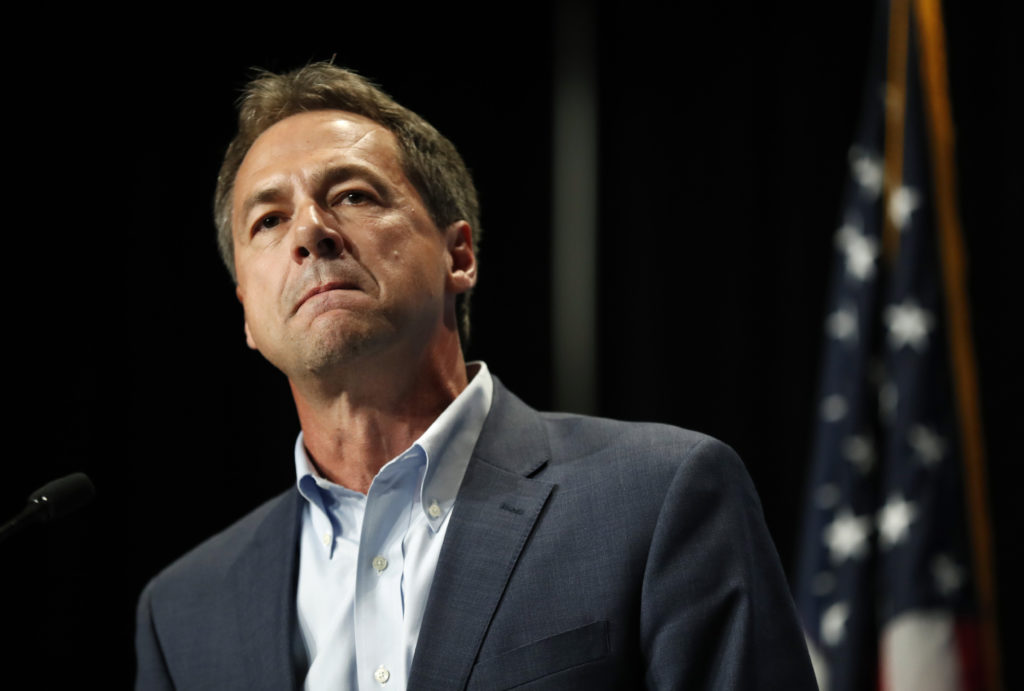
Montana Gov. Steve Bullock announced Monday that he’s ending his Democratic presidential campaign, saying it’s become clear that he won’t have a shot at being his party’s nominee. The two-term governor and former state attorney general tried to make the case that he was the best bet to beat President Donald Trump because he was the only Democratic candidate to win in a state that Trump won in 2016. But he got a late start, announcing his candidacy in May and joining nearly two dozen other Democratic candidates competing for attention and campaign donations. “While there were many obstacles we could not have anticipated when entering this race, it has become clear that in this moment, I won’t be able to break through to the top tier of this still-crowded field of candidates,” Bullock said in a statement. The governor said that he ran to win back places Democrats have lost and end the influence of “dark money” in politics. Those concerns have not changed, he said, but he leaves the race “filled with gratitude and optimism, inspired and energized by the good people I’ve had the privilege of meeting over the course of the campaign.” The 53-year-old struggled to raise money and register in the polls, managing to meet qualification thresholds for only one Democratic National Committee debate in July. He’s the third Western governor or former governor to drop out of the 2020 race after struggling to build a national profile and donor base against well-known alternatives like former Vice President Joe Biden and Vermont Sen. Bernie Sanders. Former Colorado Gov. John Hickenlooper dropped out in August to instead run for the Senate. His departure was followed quickly by that of Washington Gov. Jay Inslee, who is seeking reelection. Democrats had been pushing Bullock to give up his presidential bid and run instead for Senate, where first-term Republican Steve Daines is running for reelection. But Bullock has consistently and repeatedly said he has no interest in the Senate seat and that there are already strong candidates running against Daines. Bullock’s spokeswoman Galia Slayen reiterated that Monday. “While he plans to work hard to elect Democrats in the state and across the country in 2020, it will be in his capacity as a governor and a senior voice in the Democratic Party — not as a candidate for U.S. Senate,” Slayen said in a statement. Bullock had been exploring a presidential run since 2017, but he said he couldn’t announce his candidacy until he had finished his work in Helena, where the state legislature was meeting. He staked his presidential campaign on Iowa, and he made repeated trips to the state to campaign alongside prominent state Attorney General Tom Miller, the first statewide elected official in Iowa to endorse a 2020 candidate. Bullock stuck strictly to his campaign message of needing to win back rural Trump voters, noting he won reelection the day that Trump carried his state by 20 percentage points. He also touted his history as a crusader to eliminate the influence of anonymous and foreign money in elections. But he remained at the bottom of the polls and unfamiliar to many voters. His biggest national exposure appeared to come when he didn’t make the cut for the first debate, resulting in a slate of news stories and an appearance on “Late Night with Stephen Colbert.” Bullock was Montana’s attorney general for a term before he became governor in 2013. Before that, he worked as an assistant attorney general, as an attorney in private practice in Helena and for law firms in New York and Washington, D.C. By Michelle L. Price and Matt Volz Associated Press. Price reported from Las Vegas. Republished with the Permission of the Associated Press.
What to watch during the Donald Trump impeachment hearings
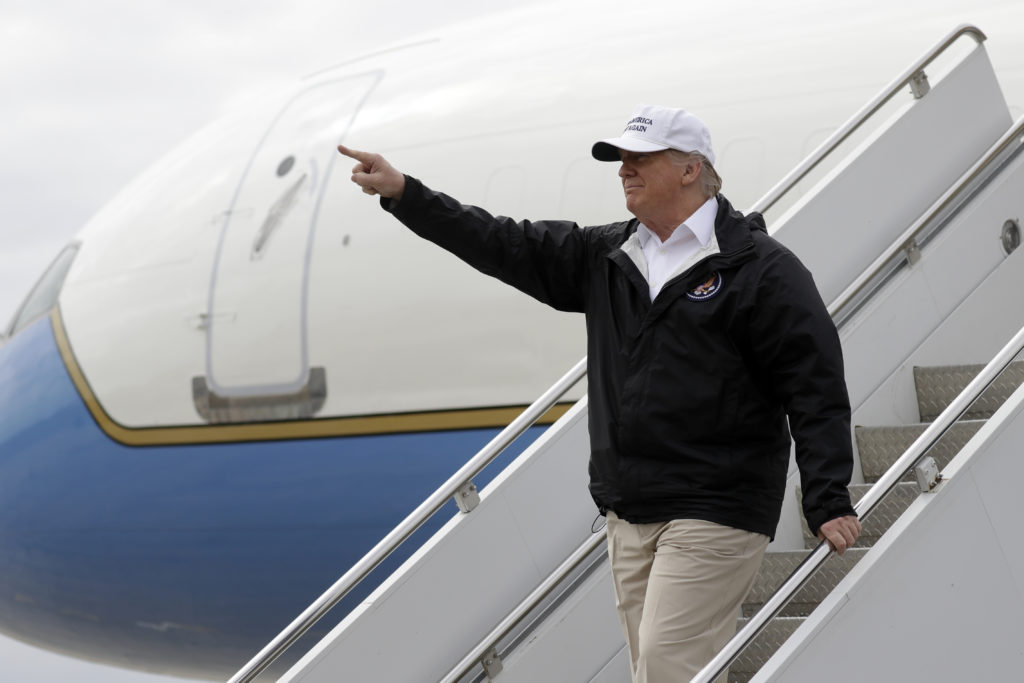
Exactly what is Gordon Sondland’s story? Certainly it’s full of international mystery, which House impeachment investigators are sorting through as they probe President Donald Trump’s pressure on Ukraine to investigate Joe Biden. But the intrigue is largely due to other witnesses recalling conversations with Sondland that he did not mention to impeachment investigators. Trump’s ambassador to the European Union, an Oregon hotelier and million-dollar Trump donor, Sondland has said he cannot recall many of the episodes involving him that others have recounted in colorful detail. What he does recall he sometimes remembers differently. The discrepancies with other witnesses, and Sondland’s with himself, matter as he testifies Wednesday under oath and penalty of perjury. What to watch when the hearings open at 9 a.m. EST: AT ISSUE Listen for how Sondland describes his role in Trump’s Ukraine policy and whether that policy was to hold up military aid until Ukraine made a public announcement that it was investigating Biden’s son Hunter Biden. Former White House national security aide Fiona Hill testified in private that Sondland informed her that he was in charge of Ukraine policy because the Republican president said so. Asked about that conversation during a deposition, Sondland said: “I don’t recall. I may have; I may not have. Again, I don’t recall.” Besides, he says now that he viewed his role on Ukraine as one of support rather than leadership. JULY 10 MEETINGS Testimony from multiple witnesses have described a pair of pivotal, sometimes tense, meetings at the White House on July 10 involving combinations of U.S. and Ukrainian leaders. Several of those present say Sondland explicitly connected a coveted White House visit to a public announcement by Ukraine of corruption investigations. Army Lt. Col. Alexander Vindman remembers Sondland saying that day that the Ukrainians would have to deliver an investigation into the Bidens. Sondland tells a different version, saying he doesn’t recall mentioning Ukraine investigations or Burisma, the gas company on whose board Hunter Biden served. The only conflict he describes from that day is a disagreement on whether to promptly schedule a call between Trump and Ukrainian President Volodymyr Zelenskiy. Sondland was in favor. EVERYTHING’ William Taylor, the acting U.S. ambassador in Ukraine, told lawmakers that Sondland said that “everything” Ukraine wanted — a White House visit for its new leader and the release of military aid — was contingent on a public announcement of investigations into the 2016 election and into Burisma. Sondland tells a more complex story. In his closed-door testimony, Sondland stated that he wouldn’t have withheld military aid for any reason. Not only that, he said he didn’t recall any conversations with the White House about withholding military assistance in return for Ukraine helping with Trump’s political campaign. Even then, though, he left himself some wiggle room, saying a text message he sent to Taylor reassuring him that there was no quid pro was simply what he had heard from Trump. Weeks later, after testimony from Taylor and National Security Council official Tim Morrison placed him at the center of key discussions, Sondland revised his account in an extraordinary way, saying “I now recall” more details. He amended his testimony to confirm that Taylor’s account was correct. Among the conversations Sondland now recalled was telling an aide to Zelenskiy in September that military aid likely would not occur until Ukraine made public announcements about corruption investigations. HOW INVOLVED WAS MULVANEY? Multiple witnesses describe a cozy relationship between Sondland and Mick Mulvaney, the White House acting chief of staff. Vindman, a National Security Council official, says Sondland cited a discussion with Mulvaney when pushing Ukrainian officials to open the investigations that Trump wanted into the 2016 presidential election and Biden. Fiona Hill, another White House national security official, says the then-national security adviser, John Bolton, told her he didn’t want to be part of “whatever drug deal Sondland and Mulvaney are cooking up.” Sondland suggests he knows Mulvaney only well enough to wave and say hello. TRUMP, REPUBLICANS? Of the nine witnesses testifying over three days this week, White House officials are concerned most about Sondland — because they aren’t sure what he’s going to say. If Sondland’s name-dropping is accurate, he may have had direct conversations with Trump. It’ll be hard for the president to attack his own EU ambassador, or for Republicans aware of the president’s expectation of loyalty, to do so. HOW SONDLAND IS SEEN OVERSEAS He calls himself a “disruptive diplomat.” Sondland may not be missed on the Continent as he testifies in Washington. Even before he got involved in Ukraine, Sondland’s caustic style had already created problems in Brussels, where he is the U.S. ambassador to the 28-nation EU. He visited Ukraine twice, even though it is not part of the EU and not part of his formal responsibilities. He also gave an interview with Ukrainian television boasting of his closeness to Trump and laying out his views of Ukraine, almost like instructions: “They’re Western and they’re going to stay Western.” Sondland is known for the grand gesture. At a party for diplomats and journalists last month at the ornate Cercle Gaulois club between the Belgian parliament and royal palace, he highlighted his close links with Trump and the president’s confidants. He spoke of a three-hour “family dinner” in Manhattan with two incoming EU leaders, Trump’s daughter Ivanka and her husband, Jared Kushner. There was also a special guest: comedian Jay Leno, who is said to be among Zelenskiy’s heroes. By Laurie Kellman Associated Press Follow Kellman on Twitter at https://www.twitter.com/APLaurieKellman Republished with the permission of the Associated Press.
7 questions heading into the 2020 democratic debate
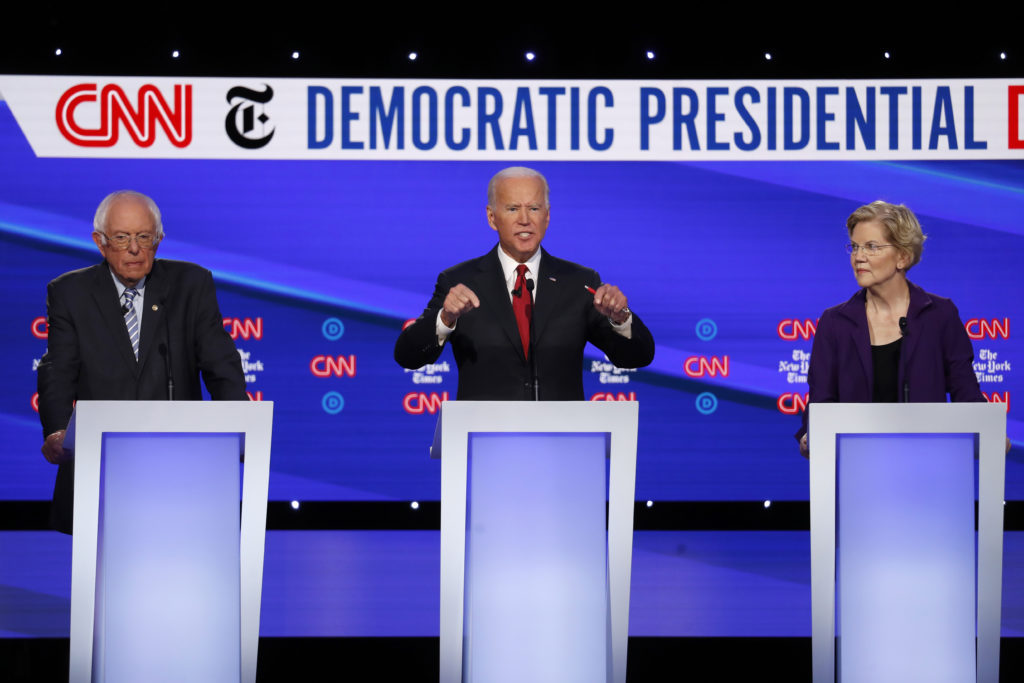
New uncertainty hangs over the Democratic presidential primary as 10 candidates meet on the debate stage once again. No longer is there a clear front-runner. The fight for African American voters is raging. And there are growing concerns that impeachment may become a distraction from the primary. Those issues and more will play out Wednesday night when the Democratic Party’s top 10 face off in Atlanta just 75 days before primary voting begins. Seven big questions heading into the debate, to be carried on MSNBC: WHO IS THE FRONT-RUNNER? Turbulent polling across the early voting states has created a murky picture of the top tier of the 2020 class. As much as Joe Biden is still a front-runner, so are Elizabeth Warren, Pete Buttigieg and Bernie Sanders. The question is who gets the front-runner treatment in Wednesday’s debate. Warren was under near-constant attack last month as a new leader. Will Warren continue to face the heat, or will the ascendant Buttigieg or weakening Biden take more hits? HOW WILL OBAMA PLAY? Former President Barack Obama, the most popular Democrat in America, inserted himself into the 2020 primary in recent days by warning candidates against moving too far to the left. His comments create a challenge for Warren and Sanders and an opening for moderates Buttigieg, Biden and Amy Klobuchar to attack. At the same time, Obama’s involvement offers a powerful reminder of the massive role African Americans will play in the presidential nomination process. As we know, all candidates not named Biden have serious work to do when it comes to winning over the black vote. Race and Obama’s legacy could play a major role in shaping the action. WHAT SAY YOU, IMPEACHMENT JURY? They have all come out in favor of impeachment — some more aggressively than others — but it’s noteworthy that five of the 10 Democrats onstage will serve as jurors in the Senate impeachment trial should the House vote to impeach President Donald Trump. It’s a complicated topic for Democrats. Some senators worry that a prospective impeachment trial will interfere with their ability to court voters early next year. Others fear that impeachment could hurt their party’s more vulnerable candidates in down-ballot elections next year. Either way, what the prospective jurors do or don’t say on the debate stage could be relevant if and when the Senate holds an impeachment trial, which is increasingly likely. WILL THEY BASH THE BILLIONAIRES? Never before has wealth been under such aggressive attack in a presidential primary election. And with one billionaire onstage and another likely to join the field in the coming days, the billionaire bashing could reach new heights. Tom Steyer has largely gone under the radar, but the even wealthier Michael Bloomberg has generated tremendous buzz as he steps toward a run of his own. Of the two, only Steyer will be onstage, but expect Bloomberg’s shadow in particular to generate passionate arguments about wealth and the role of money in politics. WILL SOMEONE STAND UP FOR THE ESTABLISHMENT? Biden continues to be the favorite of many establishment Democrats, but his underwhelming candidacy has created an opening for another pragmatic-minded Democrat to step up. That’s why former Massachusetts Gov. Deval Patrick and Bloomberg are moving into the race. Buttigieg stepped aggressively into the establishment lane in the last debate, but many donors and elected officials remain skeptical of the 37-year-old small-city mayor’s chances. The opportunity is there for lower-tier candidates including Kamala Harris, Klobuchar and Steyer. DOES SHE HAVE A PLAN FOR THAT? No single issue has dominated the initial Democratic primary debates more than health care, and it’s safe to assume that will be the case again Wednesday night. And no one has more riding on that specific debate than Warren, who hurt herself last month by stumbling through questions about the cost of her single-payer health care plan. Given that policy specifics make up the backbone of her candidacy, she can’t afford another underwhelming performance on the defining policy debate of the primary season. Expect the policy-minded senator to have a new strategy this time around. CAN THEY SAVE THEMSELVES? New Jersey Sen. Cory Booker, Hawaii Rep. Tulsi Gabbard, businessman Andrew Yang and Steyer are under enormous pressure to break out given their status as the only candidates onstage who haven’t yet qualified for the December debate. They likely won’t have the same number of opportunities to speak as their higher-polling rivals, but these are dire times for the underdogs. They need to do something if they expect to stay relevant in the 2020 conversation. By Steve Peoples AP National Political Writer. Catch up on the 2020 election campaign with AP experts on our weekly politics podcast, “Ground Game.” Republished with the permission of the Associated Press.
Donald Trump, 2020 Democrat contenders tout efforts to boost veterans
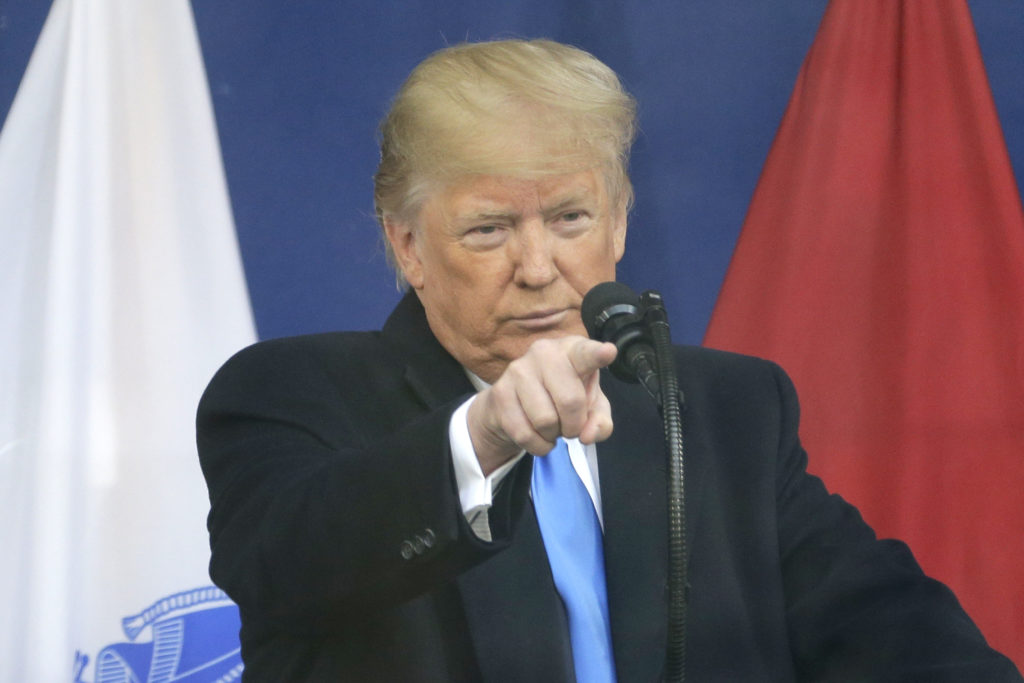
On Veterans Day, President Donald Trump paid tribute to America’s troops at a New York City parade as top 2020 Democratic candidates outlined their plans for the Department of Veterans Affairs, such as naming a woman to run the agency for the first time. The Democratic proposals, coming two days before historic impeachment hearings, sought to highlight policy differences with the embattled president before a key bloc of voters.“The president has let veterans down,” said Democrat Pete Buttigieg, the 37-year-old mayor of South Bend, Indiana. A former Navy intelligence officer, Buttigieg said female veterans and service members in particular have been neglected, including on concerns about sexual harassment and women’s health. Women are the military’s fastest-growing subgroup. “I think leadership plays a huge role so absolutely I’d seek to name a woman to lead VA,” he said. Trump was the first sitting president to attend New York’s veterans parade, viewing veterans as standing among his biggest supporters. Past presidents have typically spent Veterans Day at Arlington National Cemetery for a ceremonial wreath laying. Trump praised the strength of the U.S. military and the death of Islamic State leader Abu Bakr al-Baghdadi, saying the nation’s veterans “risked everything for us. Now it is our duty to serve and protect them every single day of our lives.” More than 100 protesters booed, some holding black balloons that read “support our troops, impeach.” In a liberal city where Trump is deeply unpopular in spite of his roots there, a nearby building’s soaring windows were adorned with signs reading “IMPEACH” and “CONVICT.” Veterans overall have strongly backed Trump throughout his presidency, though views vary widely by party, gender and age, according to AP VoteCast, a survey of 2018 midterm voters. In particular, younger veterans and women generally were more skeptical of Trump, who received multiple draft deferments to avoid going to Vietnam. Former Vice President Joe Biden, whose late son Beau spent a year in Iraq with the Army, stressed that he would “restore trust” in VA. Taking aim at Trump’s stalled progress in reducing suicide among veterans, Biden pledged to hire more VA staff to cut down office wait times for vets at risk of suicide to zero as well as continuing the efforts of the Obama-Biden administration to stem homelessness. About 20 veterans die by suicide each day, a rate basically unchanged during the Trump administration. Trump earlier this year directed a Cabinet-level task force to develop a broader roadmap for veterans’ suicide prevention, due out next spring. “Our veterans deserve leaders who will fight for them as ardently and as forcefully as they have fought for us,” Biden wrote in a Veterans Day statement with his wife, Jill. In a jab at Trump, Vermont Sen. Bernie Sanders released a video highlighting his role in working with the late Republican Sen. John McCain, a decorated war hero, to pass legislation that included the Veterans Choice program in 2014. Trump routinely takes credit for being the first to enact the Choice program. What he actually got done was an expansion of the program achieved by McCain and Sanders, a former chairman of the Senate Veterans Affairs Committee. Speaking at an event focused on seniors and veterans in Des Moines, Iowa, Sanders pledged to combat efforts to privatize the VA and assured a questioner that he would end the “very ugly practice” of deporting military veterans who are not U.S. citizens. “How cruel is it that when people put their lives on the line to protect us,” they are deported, he said. As president, Sanders promised he would build upon his past legislative efforts by making it easier for veterans to get into the VA system. He joins Buttigieg and Massachusetts Sen. Elizabeth Warren in urging increases in doctor pay to attract top VA candidates and fill 49,000 VA positions that have sat vacant as the Trump administration promoted private health care options. During a Veterans Day speech in Rochester, New Hampshire, Buttigieg reflected on his own military path, while taking some digs at Trump. “Having seen the outrage of Americans willing to put their lives on the line for this country having their careers threatened by a president who avoided his own chance to serve, yes, we are going to end the transgender military ban right away,” Buttigieg said. He added later in the speech that the VA needs to be depoliticized. “We’re going to have five-year terms for key positions so that decisions are made based on what is best for veterans and not based on whoever last spoke to the president during a golf game or made the right campaign contribution,” Buttigieg said. During a campaign stop in southeast Iowa, Biden noted that he carries with him every day the totals of those who have died as a consequence of wars in Iraq and Afghanistan. As of Monday, he told about 200 people at a private college in Oskaloosa, the total had reached 6,900. “Every single one of those fallen angels leave a broken community behind,” he said. Tens of thousands more, however, have returned home with post-traumatic stress disorder, Biden said. “They are in trouble and they deserve every single thing we can give them,” he said. Yen reported from Washington. Associated Press writers Alexandra Jaffe in Des Moines, Iowa, Tom Beaumont in Oskaloosa, Iowa, and Zeke Miller in New York contributed to this report. By Hope Yen and Hunter Woodall Associated Press. Republished with the permission of the Associated Press.
APNewsBreak: Pete Buttigieg hopes to name 1st female VA secretary
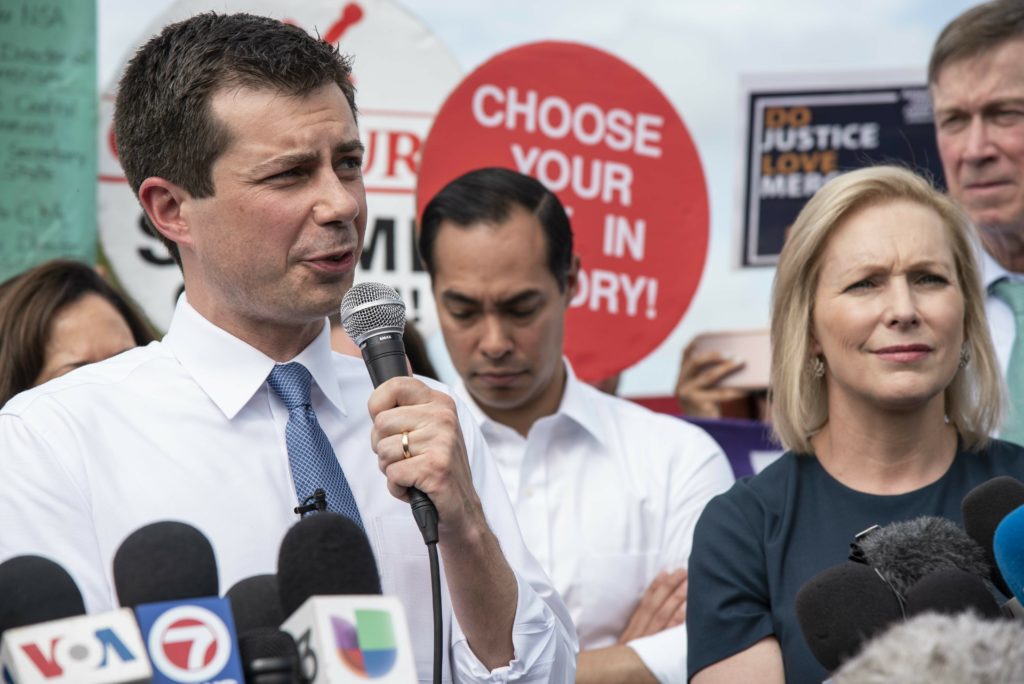
Democratic presidential candidate Pete Buttigieg says if elected he’d like to name a woman to lead the Department of Veterans Affairs for the first time as 2020 hopefuls take aim at President Donald Trump’s record on stemming military suicide and helping female vets. On Veterans Day, several candidates rolled out proposals to meet the needs of America’s 20 million former service members. Buttigieg, the 37-year-old mayor of South Bend, Indiana, said female veterans and service members have been neglected, including on concerns about sexual harassment and women’s health. Women are the military’s fastest-growing subgroup. “I think leadership plays a huge role so absolutely I’d seek to name a woman to lead VA,” Buttigieg, a former Navy intelligence officer, said in an interview with The Associated Press. His comments went a step beyond his 21-page wide-ranging plan released on Monday.“The president has let veterans down,” Buttigieg said. Of the Cabinet and Cabinet-level roles, four have never been held by a woman: Veterans Affairs, Defense, Treasury and White House chief of staff. Buttigieg says he’d take a close look at appointing a female defense secretary as well. Former Vice President Joe Biden’s campaign said he would seek to build on current gains for vets that were started under the Obama-Biden administration, such as stemming homelessness and improving mental health care. “Joe has a long record of support for veterans and our military families,” press secretary Jamal Brown said. “Bringing down the high rate of suicide among our military and veterans will be a top priority for a Biden administration.” In a dig at Trump, Vermont Sen. Bernie Sanders released a video on Monday highlighting his role in working with the late Republican Sen. John McCain, a decorated war hero, to pass legislation that included the Veterans Choice program in 2014. Trump routinely takes credit for being the first to enact the Choice program, ignoring the fact that it was signed into law by President Barack Obama. What Trump got done was an expansion of the program achieved by McCain and Sanders. That expanded program, one of Trump’s signature accomplishments, seeks to steer more veterans over the next decade to private-sector doctors outside the VA. Sanders, a former chairman of the Senate Veterans Affairs Committee who voted against Trump’s plan, says the expanded program goes too far in its investments in the private sector, rather than core VA health care , which many veterans view as better suited to treat battlefield injuries such as post-traumatic stress disorder. Sanders joins Buttigieg and Massachusetts Sen. Elizabeth Warren in urging increases in doctor pay to attract top VA candidates and fill 49,000 VA positions that have sat vacant as the Trump administration promoted private health care options. Sanders said he would fill those vacancies in his first year as president and provide at least $62 billion in new funding to repair and modernize VA facilities to provide cutting-edge care. “We will not dismantle or privatize the VA. We will expand and improve the VA,” Sanders said Monday. Buttigieg told the AP that he would look at rolling back some of the Trump administration’s rules expanding Choice. All the Democratic candidates who have articulated veterans’ plans call for added funding and training for suicide prevention. Buttigieg specifically proposes a new 24/7 VA “concierge” service aimed at guiding at-risk vets into mental health care. Currently, about 20 veterans die by suicide each day, a rate basically unchanged during the Trump administration. Trump earlier this year directed a Cabinet-level task force to develop a broader roadmap for veterans’ suicide prevention, due out next spring. Buttigieg, like Warren, would seek to improve responses to sexual assault in the military by shifting prosecution from military commanders to independent prosecutors. He also wants to put particular focus on stemming homelessness among women vets, many of whom may have experienced sexual trauma. He pointed to his seven-month deployment in Afghanistan in 2014 and watching the impact a female general had “culturally” on the NATO-led International Security Assistance Force. “When a leadership body is more gender diverse, it makes better decisions. So I would absolutely be looking at that,” Buttigieg told the AP. He’s previously pledged to appoint women to at least 50 percent of his Cabinet positions. While veterans overall have strongly backed Trump throughout his presidency, views vary widely by party, gender and age, according to AP VoteCast, a survey of 2018 midterm voters. In particular, younger veterans and women generally were more skeptical of Trump, who received multiple draft deferments to avoid going to Vietnam. A study released by the VA earlier this year found 1 in 4 women veterans using VA health care reported inappropriate comments by male veterans on VA grounds, raising concerns they may delay or miss their treatments. The VA also has rebuffed efforts by Iraq and Afghanistan Veterans of America and other groups to change the VA motto, which some vets believe is outdated and excludes women. That motto refers to the VA’s mission to fulfill a promise of President Abraham Lincoln “to care for him who shall have borne the battle, and for his widow, and his orphan.” Buttigieg said he would direct his VA secretary to change that motto to “fairly represent the diversity of service members and veterans.” Currently, about 10 percent of the nation’s veterans are female. In the U.S. military forces, about 17 percent of those enlisted are women, up from about 2 percent in 1973. By Hope Yen Associated Press HOPE YEN. Republished with the permission of the Associated Press.
Michael Bloomberg opens door to 2020 Democratic run for president
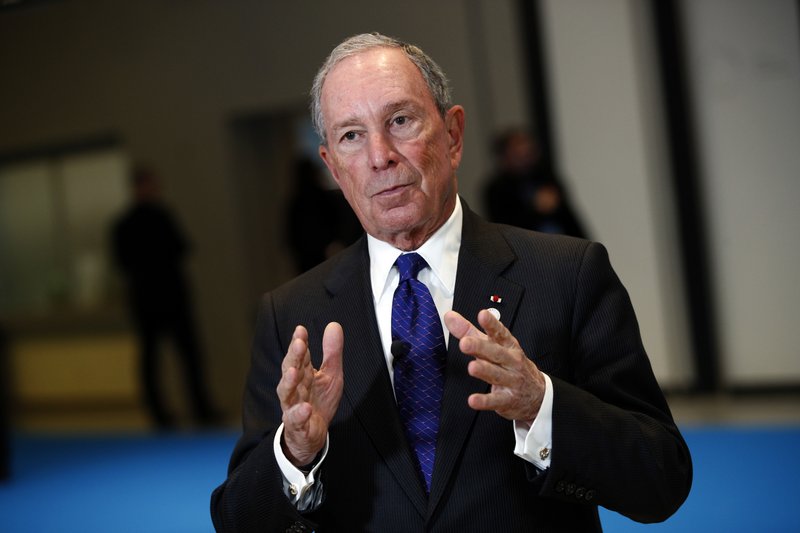
Michael Bloomberg, the billionaire former mayor of New York City, is opening the door to a 2020 Democratic presidential campaign, warning that the current field of candidates is ill equipped to defeat President Donald Trump. Full Coverage: Election 2020 Bloomberg, who initially ruled out a 2020 run, has not made a final decision on whether to jump into the race. If he were to launch a campaign, it could dramatically reshape the Democratic contest less than three months before primary voting begins. The 77-year-old has spent the past few weeks talking with prominent Democrats about the state of the 2020 field, expressing concerns about the steadiness of former Vice President Joe Biden’s campaign and the rise of liberal Massachusetts Sen. Elizabeth Warren, according to people with knowledge of those discussions. In recent days, he took steps to keep his options open, including moving to get on the primary ballot in Alabama ahead of the state’s Friday filing deadline. In a statement on Thursday, Bloomberg adviser Howard Wolfson said the former mayor believes Trump “represents an unprecedented threat to our nation” and must be defeated. “But Mike is increasingly concerned that the current field of candidates is not well positioned to do that,” Wolfson said. Bloomberg’s moves come as the Democratic race enters a crucial phase. Biden’s front-runner status has been vigorously challenged by Warren and Vermont Sen. Bernie Sanders, who are flush with cash from small-dollar donors. But both are viewed by some Democrats as too liberal to win in a general election faceoff with Trump. Despite a historically large field, some Democrats anxious about defeating Trump have been looking for other options. Former Attorney General Eric Holder and former Massachusetts Gov. Deval Patrick have quietly had conversations with supporters urging them to consider a run, but neither appears likely to get in the race. Bloomberg, a Republican-turned-independent who registered as a Democrat last year, has flirted with a presidential run before but ultimately backed down, including in 2016. He endorsed Hillary Clinton in that race and, in a speech at the Democratic Party convention, pummeled Trump as a con who has oversold his business successes. Bloomberg plunged his efforts — and his money — into gun control advocacy and climate change initiatives. He again looked seriously at a presidential bid earlier this year, traveling to early voting states and conducting extensive polling, but decided not to run in part because of Biden’s perceived strength. Biden did not address Bloomberg’s potential candidacy at a fundraiser Thursday night in Boston. With immense personal wealth, Bloomberg could quickly build out a robust campaign operation across the country. Still, his advisers acknowledge that his late entry to the race could make competing in states like Iowa and New Hampshire, which have been blanketed by candidates for nearly a year, difficult. Instead, they previewed a strategy that would focus more heavily on the March 3 “Super Tuesday” contests, including in delegate-rich California. Some Democrats were skeptical there would be a groundswell of interest in the former New York mayor. “There are smart and influential people in the Democratic Party who think a candidate like Bloomberg is needed,” said Jennifer Palmieri, who advised Clinton’s 2016 campaign. “But there is zero evidence that rank-and-file voters in the early states of Iowa and New Hampshire feel the same.” Still, others credited Bloomberg with taking on “some of America’s biggest challenges” and finding success. “While this is not an endorsement, Michael Bloomberg is a friend and I admire his track record as a successful business leader and Mayor who finds practical solutions to some of America’s biggest challenges, from creating good jobs to addressing the opioid crisis and fighting for common-sense gun safety,” said Rhode Island Gov. Gina Raimondo, a Democrat. Bloomberg reached out to several prominent Democrats on Thursday, including Raimondo. One Democrat Bloomberg hasn’t spoken to as he’s reconsidered his run is former President Barack Obama. Bloomberg would pose an immediate ideological challenge to Biden, who is running as a moderate and hopes to appeal to independents and Republicans who have soured on Trump. But the billionaire media mogul with deep Wall Street ties could also energize supporters of Warren and Sanders, who have railed against income inequality and have vowed to ratchet up taxes on the wealthiest Americans. “He’s a literal billionaire entering the race to keep the progressives from winning,” said Rebecca Katz, a New York-based liberal Democratic strategist. “He is the foil.” Warren on Thursday tweeted: “Welcome to the race, @MikeBloomberg!” and linked to her campaign website, saying he would find there “policy plans that will make a huge difference for working people and which are very popular.” Bloomberg would face other challenges as well, particularly scrutiny of his three terms as mayor. He has defended the New York Police Department’s use of the controversial stop-and-frisk policy that has been criticized as targeting African Americans and Hispanics. Black voters in particular are one of the most powerful constituencies in Democratic politics. Bloomberg will have to move quickly in the coming days and weeks to get on the ballot in many of the primary states, including Alabama. New Hampshire’s filing deadline is Nov. 15. In Arkansas, another Super Tuesday state, a Democratic Party spokesman said a person representing a “mystery candidate” reached out Thursday afternoon asking about the requirements to join the ballot. Reed Brewer, communications director for the Arkansas Democrats, said he walked the individual through the process — which simply requires filing documentation with both the state party and secretary of state, as well as paying a $2,500 fee — and was assured that the fee would be “no problem” for the mystery candidate. There is no filing requirement for a candidate to run in the Iowa caucuses, which are a series of Democratic Party meetings, not state-run elections. It means a candidate can enter the race for the Feb. 3 leadoff contest at any time. Associated Press writers Jill Colvin in Washington; Alexandra Jaffe and Thomas Beaumont in Des Moines,
From toast of town to toxic: Mark Zuckerberg on outs with democrats
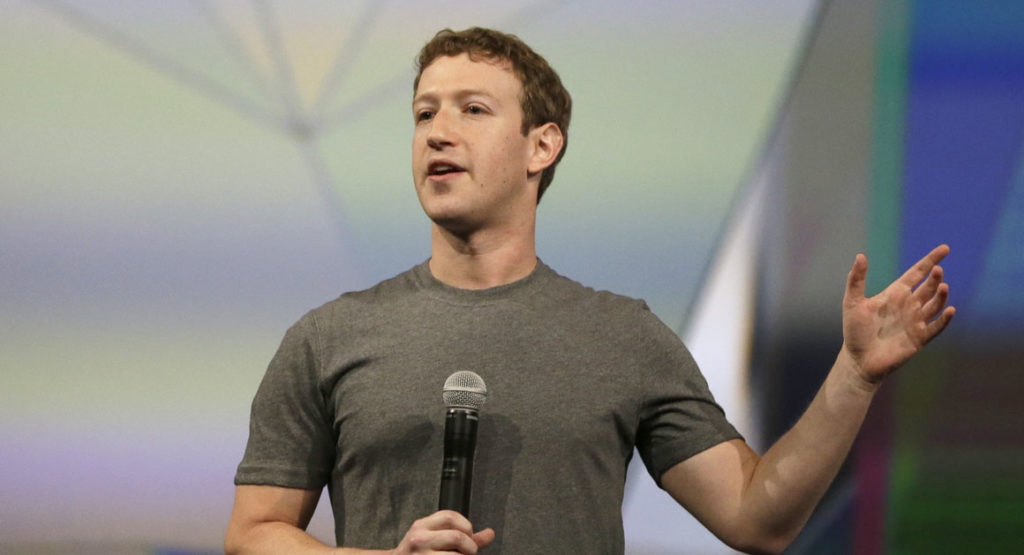
Mark Zuckerberg’s social network in Washington is shrinking. Bipartisan hostility against Facebook has been building for months, fueled by a series of privacy scandals, the site’s role in Russian meddling in the 2016 presidential campaign and accusations that Facebook crushes competitors. Now, with the 2020 elections approaching, Democrats especially are homing in on the conduct of the social media giant and its refusal to fact-check political ads and remove false ones. “When you’re the No. 1 monopoly, people are going to come after you,” says John Feehery, a veteran Republican communications strategist. The challenge for Democrats, as he sees it: “They’re facing a base that is very angry and restive. So they have to be much more aggressive in taking on corporations.” Zuckerberg enjoyed a cozy relationship with the Obama administration. But in the face of growing public outrage, the co-founder of the upstart born under the motto “Move fast and break things” is learning the art of smoothing over and piecing back together. His new strategy: a personal blitz featuring serial private meetings in Washington with key lawmakers of both parties and President Donald Trump; small, off-the-record dinners at his California home with conservative journalists and opinion makers; and the occasional public address or TV interview. Addressing criticisms from Democratic lawmakers and civil rights groups over Facebook’s track record on fighting discrimination, Zuckerberg and Chief Operating Officer Sheryl Sandberg planned to host a dinner Monday night with civil rights leaders. The two executives want to hear the leaders’ “direct perspective and feedback,” the company said. The Rev. Al Sharpton said last week that Zuckerberg would meet with him and others to discuss concerns such as Facebook’s handling of political messages. Misinformation on the platform can contribute to the suppression of voting by African Americans and other minorities, civil rights leaders say. Zuckerberg has become lobbyist-in-chief for a tech giant that has about 60 people officially playing that role. The company spent an estimated $12.6 million on federal influencing last year. The political ad issue hits close to home for Democrats. Facebook, as well as Twitter and Google, refused in September to remove a misleading video ad from Trump’s reelection campaign that targeted top-tier Democratic candidate Joe Biden. Sen. Elizabeth Warren, another top Democratic contender, chose to hit back by running her own ad and making it personal by falsely claiming that Zuckerberg had endorsed Trump for 2020. Warren, who has called for breaking up Facebook and other tech giants, acknowledged the ad’s deliberate falsity to make her point. Then came Zuckerberg’s speech last month at Georgetown University in which he promoted free expression as the foundation for Facebook’s refusal to take down content it deems newsworthy, even if the material violates company standards. The next week, during prickly questioning by Democratic lawmakers at a televised House hearing, Zuckerberg dug in on not fact-checking politicians’ speech and the handling of hate speech and potential incitements to violence. “This really is not about money,” Zuckerberg insisted. “It is important that people can see for themselves what politicians are saying.” Facebook says political advertising accounts for less than half of 1 percent of its total revenue. Separately from political advertising, Facebook has policies and improved technology that it says now enables it to more efficiently detect terrorist content in many languages. Following the mass shooting in New Zealand last spring, for example, Facebook now prohibits livestreaming by people who have violated rules covering organizations and individuals deemed dangerous and potentially violent. In the lambasting from Democrats, Rep. Joyce Beatty of Ohio, the vice chair of the Congressional Black Caucus, focused on Facebook’s track record on civil rights and diversity. She told Zuckerberg that he had “ruined the lives of many people, discriminated against them.” As part of a legal settlement with civil rights groups, Facebook changed its ad-targeting systems this year to prevent discrimination in housing, credit and employment ads. It previously had allowed such ads to be targeted to people based on age, sex or race, which is illegal. At some points, friendlier Republican members of the House Financial Services Committee asked Zuckerberg how he was holding up through the six-hour hearing. “I’m doing OK,” replied the 35-year-old co-founder, chairman and CEO. He’s one of the world’s richest individuals, with a net worth currently estimated at $71 billion. Summing up, Rep. Maxine Waters, the California Democrat who leads the committee, told Zuckerberg, “You have opened up a discussion about whether Facebook should be broken up.” A mandated breakup would be the worst-case scenario for Facebook and the other big tech companies. Facebook says splitting up large tech corporations would make the election system more vulnerable to interference because the companies wouldn’t be able to work together to prevent it. For Zuckerberg and the Democrats, “it may be a nasty divorce,” said James Thurber, a professor of government at American University who founded its Center for Congressional and Presidential Studies. “He clearly has taken a stand that’s really quite unpopular.” Thurber called Zuckerberg’s backstage celebrity approach to lobbying efforts “very dangerous.” “You’ve got to be very careful about that, if you think you can do it yourself,” he said. Rep. David Cicilline, a senior House Democrat who leads the Judiciary Committee’s investigation into the market dominance of big tech companies, is working on legislation that may target the profits made by Facebook from political ads it knows are false. The measure likely would also apply to social media rivals Twitter and Google. Last Wednesday, Twitter made the unexpected announcement that it will ban all political advertising from its service. “This is a good first step,” Cicilline tweeted. “Your move, Google/Facebook.” Zuckerberg’s quick riposte, during Facebook’s quarterly conference call on earnings, was to reaffirm the company’s commitment to the value of free speech, including for politicians. It’s a sharp reversal of fortune for Facebook from the days of the Obama administration, when the company was hailed as an exemplar of innovation and an engine of economic growth. Campaign money flowed to the
Democrats prep for open hearings, seek John Bolton testimony
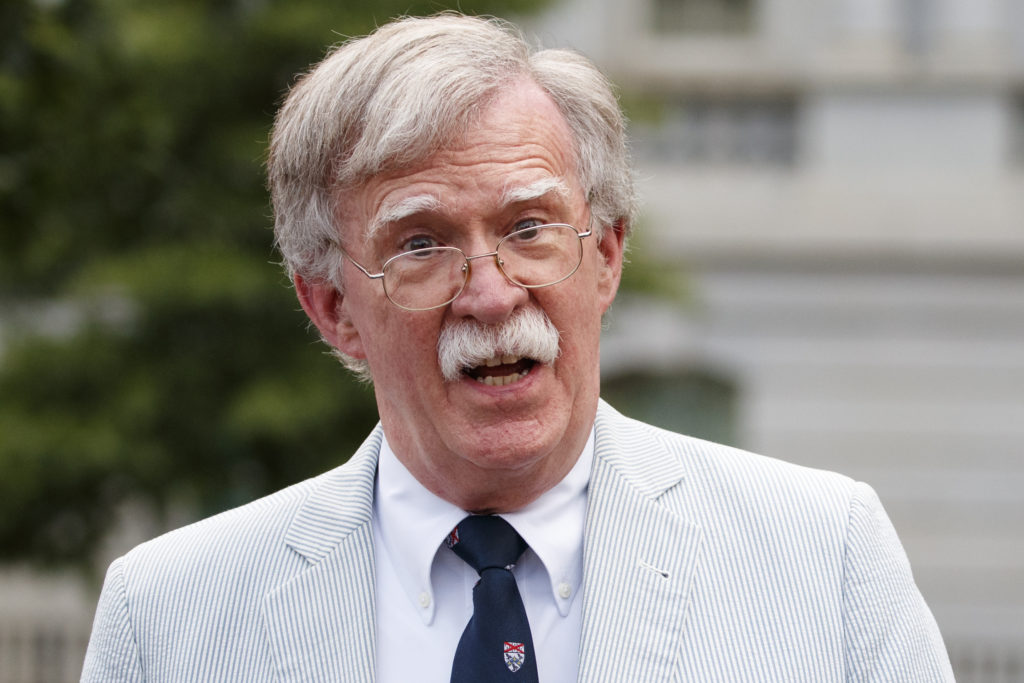
For only the fourth time in U.S. history, the House of Representatives has started a presidential impeachment inquiry. House committees are trying to determine whether President Donald Trump violated his oath of office by asking Ukraine to investigate political rival Joe Biden and his family, and to investigate the country’s involvement in the 2016 U.S. presidential election. A quick summary of the latest news and what’s to come: MOVING INTO PUBLIC VIEW The chairman of the House Intelligence Committee, Rep. Adam Schiff, told The Associated Press on Friday that the three committees leading the impeachment investigation plan to begin releasing transcripts of closed-door interviews as soon as early this week. The committees have interviewed current and former officials from the State Department and White House who have expressed concerns about Trump’s efforts to urge Ukraine to investigate Biden and his family. California Rep. Jackie Speier, a Democratic member of the Intelligence Committee, told CBS’ “Face the Nation” on Sunday that she expects one more week of closed-door interviews before committees move into open hearings. It’s so far unclear who will be asked to testify or how many hearings will be held. Leaders of the investigation say the hearings will be crucial to explain their inquiry to the American people. Schiff, Democrat-California said he hopes the testimony will eventually show “what the president did, why his misconduct is so serious” and how the “machinery of government” was pressed to help Trump influence the 2020 election. THE WHISTLEBLOWER A lawyer for the whistleblower who raised alarms about Trump’s dealings with Ukraine says his client has offered to answer written questions submitted by House Republicans.The surprise offer was made to Rep. Devin Nunes, the top Republican on the House Intelligence Committee. It would allow Republicans to ask questions of the whistleblower, who spurred the Democratic-led impeachment inquiry, without having to go through Schiff.Attorney Mark Zaid tweeted Sunday that the whistleblower would answer questions directly from Republican members “in writing, under oath & penalty of perjury,” part of a bid to stem escalating efforts by Trump and his GOP allies to unmask the person’s identity. Only queries seeking the person’s identity won’t be answered, he said. Nunes hasn’t commented on the proposal. Rep. Jim Jordan, an Ohio Republican and member of the House Judiciary Committee who has been highly critical of the impeachment process, said in a statement that written answers wouldn’t be sufficient to probe and cross-examine the whistleblower. The whistleblower raised concerns about Trump’s July 25 call with Ukrainian President Volodymyr Zelenskiy, in which he pressed Zelenskiy to investigate Trump’s political rivals. MORE BEHIND CLOSED DOORS As they prepare to go public, impeachment investigators are continuing to schedule private depositions. Democrats have called in 11 witnesses this week, including Energy Secretary Rick Perry and former national security adviser John Bolton. It’s unclear whether any of them will come to Capitol Hill. Perry is the first member of Trump’s Cabinet asked to appear before the House. His testimony is scheduled for Wednesday, according to an official working on the impeachment inquiry who spoke wasn’t authorized to publicly discuss the planning and spoke on condition of anonymity. Energy Department spokeswoman Shaylyn Hynes indicated Friday that Perry would not appear for the closed-door hearing but would consider testifying in a public session.On Bolton, Schiff said he “has very important information about the president’s misconduct that the American people should hear.” Other witnesses in the inquiry have described Bolton’s concerns as Trump urged the Ukrainian investigations. The committees have invited Bolton to appear Thursday but not issued a subpoena for his testimony. Trump says he’s not going to insist that Bolton not testify. Bolton’s lawyer has said he will not appear without a subpoena. “It’s up to him and it’s up to the lawyers,” Trump told reporters. The committees also have scheduled and subpoenaed other witnesses from the White House and State Department. They include David Hale, an undersecretary at the State Department who has been mentioned in previous testimony. Key witnesses last week included Alexander Vindman and Tim Morrison of the National Security Council. Morrison, who stepped down the day before his testimony, confirmed that military aid to Ukraine was held up by Trump’s demands for the investigations. But Morrison testified that there was nothing illegal, in his view, about the quid pro quo at the center of the impeachment inquiry. Vindman testified that he had raised concerns about Trump’s pleas. COURT BATTLES Democrats are also fighting impeachment battles in court, though they have indicated that they don’t want to delay the investigation as those cases proceed. One witness called by Democrats, former National Security Council deputy Charles Kupperman, has asked a judge to decide whether he must appear before Congress. Trump has said his administration will not cooperate, and Kupperman has said he is caught between the two. Kupperman’s lawyer, Charles Cooper, is also Bolton’s lawyer. He said Bolton could be added to the case. Republished with the permission of the Associated Press.
Ex-Donald Trump adviser arrives to testify in impeachment inquiry
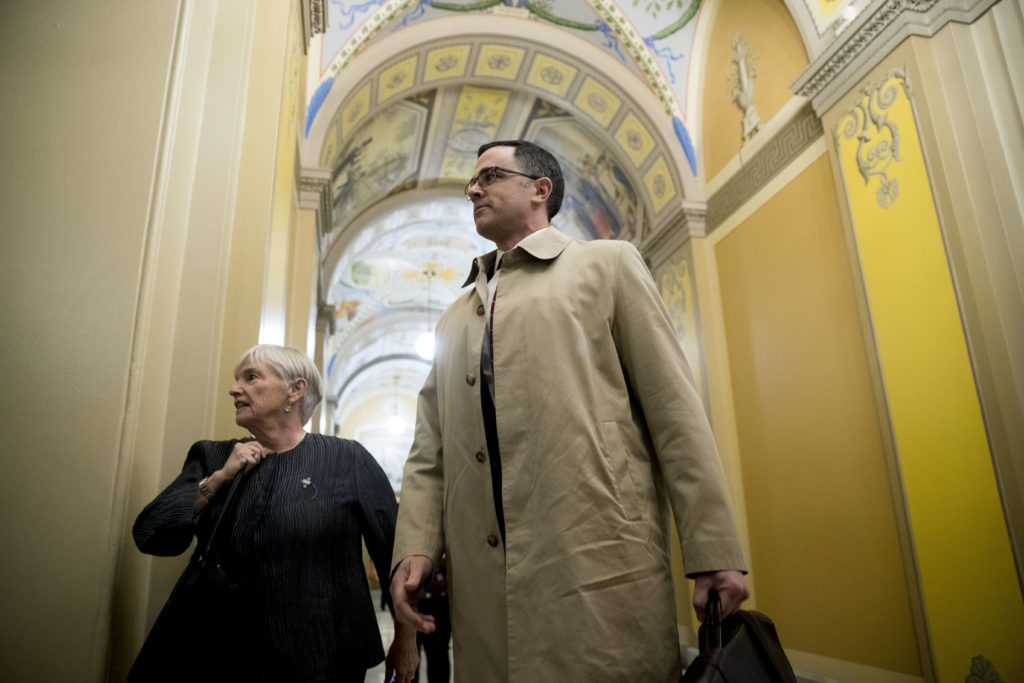
President Donald Trump’s former top adviser for Russian and European affairs arrived on Capitol Hill Thursday to testify to House impeachment investigators, a day after leaving his job at the White House. Tim Morrison, the first White House political appointee to testify, didn’t respond to reporters’ questions about his testimony, which takes place behind closed doors, but his information might be central to a push to remove the president from office. Morrison, who served on the National Security Council, stepped down from that post Wednesday, and a senior administration official said he “decided to pursue other opportunities.” The official, who was not authorized to discuss Morrison’s job and spoke only on the condition of anonymity, said Morrison has been considering leaving the administration for “some time.” He has been in the spotlight since August when a government whistleblower said multiple U.S. officials had said Trump was “using the power of his office to solicit interference from a foreign country in the 2020 U.S. election.” Morrison will be asked to explain that “sinking feeling” he got when Trump demanded that Ukraine’s president investigate former Vice President Joe Biden and meddling in the 2016 election. Morrison was brought on board by then-national security adviser John Bolton to address arms control matters and later shifted into his current role as a top Russia and Europe adviser. It was there that he stepped into the thick of an in-house squabble about the activities of Trump’s personal attorney Rudy Giuliani, who had been conversing with Ukrainian leaders outside of traditional U.S. diplomatic circles. Known as a “hawk” in national security circles, Morrison is the first political appointee from the White House to testify before impeachment investigators. The probe has been denounced by the Republican president, who has directed his staff not to testify. Regardless of what he says, GOP lawmakers will be hard-pressed to dismiss Morrison, formerly a longtime Republican staffer at the House Armed Services Committee. He’s been bouncing around Washington in Republican positions for two decades, having worked for Rep. Mark Kennedy, Republican-Minnesota, Sen. Jon Kyl, Republican-Arizona, and as a GOP senior staffer on the House Armed Services Committee, including nearly four years when it was chaired by Rep. Mac Thornberry, Republican-Texas. Morrison’s name appeared more than a dozen times in earlier testimony by William Taylor, the acting U.S. ambassador in Ukraine, who told impeachment investigators that Trump was withholding military aid unless the new Ukrainian president, Volodymyr Zelenskiy, went public with a promise to investigate Trump’s political rival Joe Biden and his son Hunter. Taylor’s testimony contradicts Trump’s repeated denials that there was any quid pro quo. Taylor said Morrison recounted a conversation that Gordon Sondland, America’s ambassador to the European Union, had with a top aide to Zelenskiy named Andriy Yermak. Taylor said Morrison told him security assistance would not materialize until Zelenskiy committed to investigate Burisma, a Ukrainian gas company that once employed Biden’s son. A White House meeting for Zelenskiy also was in play. “I was alarmed by what Mr. Morrison told me about the Sondland-Yermak conversation,” Taylor testified. “This was the first time I had heard that the security assistance — not just the White House meeting — was conditioned on the investigations.” Taylor testified that Morrison told him he had a “sinking feeling” after learning about a Sept. 7 conversation Sondland had with Trump. “According to Mr. Morrison, President Trump told Ambassador Sondland that he was not asking for a quid pro quo,” Taylor testified. “But President Trump did insist that President Zelenskiy go to a microphone and say he is opening investigations of Biden and 2016 election interference, and that President Zelenskiy should want to do this himself. Mr. Morrison said that he told Ambassador Bolton and the NSC lawyers of this phone call between President Trump and Ambassador Sondland.” Morrison told people after Bolton was forced out of his job that the national security adviser had tried to stop Giuliani’s diplomatic dealings with Ukraine and that Morrison agreed, according to a U.S. official, who was not authorized to discuss Morrison’s role in the impeachment inquiry and spoke only on condition of anonymity. The official said Morrison told people that with the appointment of Robert O’Brien as Bolton’s successor, his own future work at the NSC was in a “holding pattern.” Bolton had brought Morrison into the NSC in July 2018 as senior director for weapons of mass destruction and biodefence. He’s known as an arms control expert or an arms treaty saboteur, depending on who you ask. Morrison, who earned a bachelor’s degree from the University of Minnesota and a law degree from George Washington University, keeps nuclear strategist Herman Kahn’s seminal volume on thermonuclear warfare on a table in his office. Daryl Kimball, executive director of the Arms Control Association, said Bolton and Morrison are likeminded. Kimball said both have been known for calling up GOP congressional offices warning them against saying anything about arms control that didn’t align with their views. “Just as John Bolton reportedly did, I would be shocked if Morrison did not regard Giuliani’s activities as being out of bounds,” said Kimball, who has been on opposite sides of arms control debates with Morrison for more than a decade. By Deb Riechmann Associated Press Associated Press writers Zeke Miller and Matthew Lee contributed to this report. Republished with the permission of the Associated Press.
Twitter bans all political advertisements
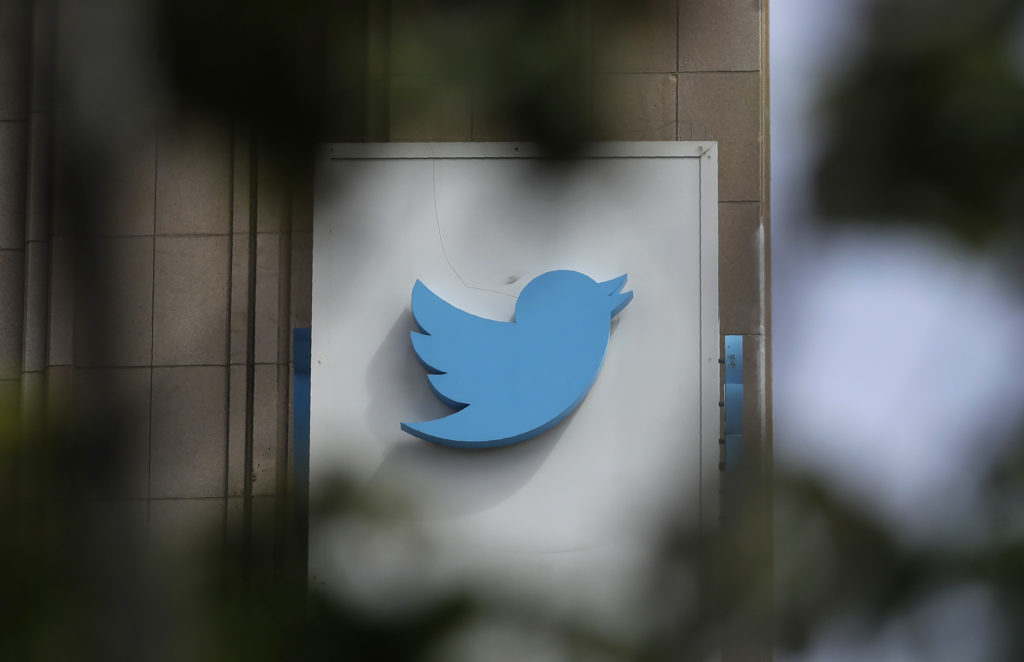
Twitter is banning all political advertising from its service, saying social media companies give advertisers an unfair advantage in proliferating highly targeted, misleading messages. “While internet advertising is incredibly powerful and very effective for commercial advertisers, that power brings significant risks to politics, where it can be used to influence votes to affect the lives of millions,” Twitter CEO Jack Dorsey tweeted Wednesday in a series of tweets announcing the new policy. Facebook has taken fire since it disclosed earlier in October that it will not fact-check ads by politicians or their campaigns, which could allow them to lie freely. CEO Mark Zuckerberg told Congress last week that politicians have the right to free speech on Facebook. The issue suddenly arose in September when Twitter, along with Facebook and Google, refused to remove a misleading video ad from President Donald Trump‘s campaign that targeted former Vice President Joe Biden, a leading Democratic presidential candidate. In response, Democratic Sen. Elizabeth Warren, another presidential hopeful, ran her own ad on Facebook taking aim at Zuckerberg. The ad falsely claimed that Zuckerberg endorsed President Donald Trump for re-election, acknowledging the deliberate falsehood as necessary to make a point. Critics have called on Facebook to ban all political ads. These include CNN chief Jeff Zucker, who recently called the company’s policy of allowing lies “absolutely ludicrous” and advised the social media giant to sit out the 2020 election until it can figure out something better. Google and Facebook did not have immediate comments on Twitter’s policy change.Montana Gov. Steve Bullock, who is running a 2020 Democratic presidential campaign, retweeted Dorsey’s announcement, adding the comment “Good. Your turn, Facebook.”Dorsey said the company is recognizing that advertising on social media offers an unfair level of targeting compared to other mediums. It is not about free expression, he asserted. “This is about paying for reach. And paying to increase the reach of political speech has significant ramifications that today’s democratic infrastructure may not be prepared to handle,” he tweeted. “It’s worth stepping back in order to address.” Twitter currently only allows certified campaigns and organizations to run political ads for candidates and issues. It will ban both types of political ads. The company said some exceptions will be made, including ads that encourage voter turnout. It will describe those in a detailed policy it plans to release on Nov. 15. Federal campaigns are expected to spend the majority of advertising dollars on broadcast and cable channels during the 2020 election, according to advertising research firm Kantar, and about 20% of the total $6 billion in spending on digital ads.Twitter’s policy will start on Nov. 22. Republished with the permission of the Associated Press.


